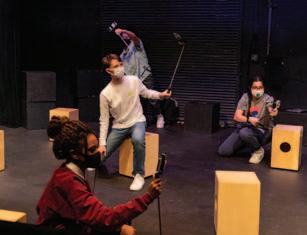Learning By Doing Half a Century of Winterim by Joe Sheppard
Like other schools in the early 1970s, Lawrence Academy turned itself inside out in a frenzied effort to hurry up and make learning relevant to a generation of discontented, rebellious young people who wanted nothing to do with the values, habits, and morals — or education — of their parents’ generation. New headmaster Ben Williams brought in some new faculty specifically to shake things up and start building a new Lawrence Academy on the foundations of the school that had passed into history with the retirement of Arthur Ferguson in 1969. Term-length elective courses, hitherto unheard of, were an early step in spicing up the curriculum. Catchy titles such as “No, But I Read the Book,” “Find That Fairy,” and “Revolution” were designed to attract wary students who demanded anything but more of the same. Independent studies sprouted up like mushrooms after a spring rain. By 1973, seniors’ transcripts required two pages because of all the electives and their fancy names. The curricular bling toned down after a few years, with simple, descriptive course titles replacing the fairies and the revolutionaries, but the shape of a Lawrence Academy education was forever changed, largely due to one of Ben Williams’ new teachers: Vincent P. (“Vin” — never “Vince!”) Skinner, hired in 1971 to teach English — and to reform the curriculum. As Mr. Williams put it in a recent conversation,
Winterim cover illustration, 1972
2 2 LAWRENCE ACADEMY FALL 2021
“I was impressed by his résumé. And I thought John Curran, a strong advocate of change, needed a kindred spirit.” Though he spent only four years at LA, Skinner left an indelible imprint on the school as the founder of both Lawrence II (later renamed the IIP) and, especially, Winterim, the 50th anniversary of which we are celebrating this year. Winterim was designed to be “experiential” in nature — students would learn by doing and reflecting on what they had done, as opposed to learning by rote — and, therefore, appealing to a generation that demanded something new and different. The term “experiential learning” was just coming into common use in the 1970s, but the concept is ancient: Around 350 B.C., Aristotle wrote, “For the things we have to learn before we can do them, we learn by doing them.” Both the winter term and the spring vacation were shortened by a week to make room for Winterim. From a teacher’s point of view, it was a blessing: The winter trimester was interminably long, and by the time March rolled around, everyone was exhausted. The kids, of course, were seduced by the siren call of the long, lazy, three-week vacation that was so close, yet so far away. Add in the student restlessness and discontent of the early 1970s, and it’s easy to see that something had to change. Winterim promised something new: a replacement for listening and repeating, absorbing and regurgitating — for two weeks of the school year, at least. It would provide, as the 1975 course booklet put it:



















